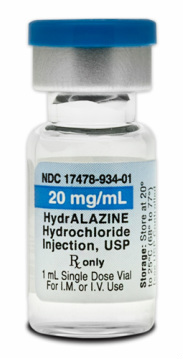Pharmacology definition - Hydralazine

Hydralazine
Hydralazine is useful in treating patient by reducing afterload in case of heart failure. In this scenario, hydralazine will reduce the strain on the affected heart. Hydralazine is also useful as a treatment for hypertension.
Hydralazine will reduce/ inhibit the contraction of vascular smooth muscle by blocking the release of the calcium ion from the sarcoplasmic reticulum which present in the vascular smooth muscle. Hydralazine will cause relaxation of arteriolar smooth muscle. Therefore, the blood pressure will be reduced.
The common side effects of hydralazine include retention of fluid ( treated by administrating hydralazine with diuretics), angina due to reflex tachycardia ( treated by administrating hydralazine with beta blocker) drug induce lupus and headache as well as gastrointestinal discomfort.
Hydralazine is useful in treating patient by reducing afterload in case of heart failure. In this scenario, hydralazine will reduce the strain on the affected heart. Hydralazine is also useful as a treatment for hypertension.
Hydralazine will reduce/ inhibit the contraction of vascular smooth muscle by blocking the release of the calcium ion from the sarcoplasmic reticulum which present in the vascular smooth muscle. Hydralazine will cause relaxation of arteriolar smooth muscle. Therefore, the blood pressure will be reduced.
The common side effects of hydralazine include retention of fluid ( treated by administrating hydralazine with diuretics), angina due to reflex tachycardia ( treated by administrating hydralazine with beta blocker) drug induce lupus and headache as well as gastrointestinal discomfort.
